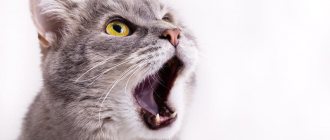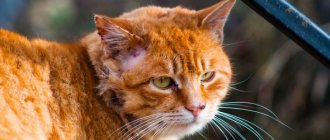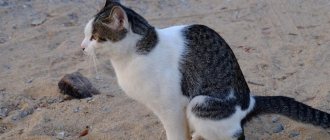You can often observe domestic furry animals sticking out their tongues. Moreover, it can look both charming and scary. After all, this condition is not permanent for a cat. Some owners are simply annoyed by this state of affairs, but it doesn’t hurt to understand the reasons for this behavior and understand why cats stick out the tip of their tongues in each specific case.
Let's try to find out whether this is normal or pathological. When is it necessary to urgently call the veterinarian, and when is there no need to worry? Experts believe that a protruding cat's tongue without signs of pathology is simply a habit, or a breed predisposition. This primarily applies to breeds with short muzzles - such as Persians, Britons, Scots, Himalayans and exotics. All representatives of these breeds feel very comfortable with their tongue hanging out.
Of course, you need to look at the issue differently when the tongue is not just sometimes stuck out, but is there all the time. In this case, the animal must be examined by a professional. If the reasons are found, then the issue is resolved accordingly. What to do if the cat was planned for breeding, and a protruding tongue is an inherited defect? Of course, this problem needs to be resolved with veterinarians and felinologists on an individual basis.
When a cat with its tongue hanging out is healthy
Several variations are possible that do not pose a threat to health when the rough tongue is removed from the mouth of an adult or kitten:
- If a cat was cleaning itself by licking its fur, and was distracted by something interesting, for example, a bird flew past or the owners carried food past, he may well forget to hide his tongue and sit, looking into space, looking extremely stupid, and for quite a long time. If the cat is active, eats well, and plays, then nothing bad is happening. She just likes to walk like that.
- Another situation when a cat’s tongue sticking out is the norm is during childbirth. Here the cat has the right to breathe heavily, its body is doing difficult work and its muscles need more oxygen. Observe your pet carefully during labor, but without fuss. Additionally, you may need the help of a veterinarian or a trip to the clinic if labor stops and a caesarean section is required.
- A cat has the right to stick out the tip of its tongue when sleeping , especially deeply. This is a muscle that when it relaxes, it becomes longer. For those who are awake, it is constantly in good shape.
- A simple explanation can also be found when cats stick out their tongues after operations: the anesthesia includes drugs that relax the muscles. Their effect will stop within a day, but in the meantime, you should carefully moisten your pet’s mouth with water.
- Cats may stick out their tongues when flirting with the opposite sex. Moreover, it is not necessary to be nearby; males can smell females in heat 5 kilometers away.
The animal may be “teased” - stress, especially if the cat reacts to an unfamiliar environment, is accompanied by profuse drooling.
Why do cats stick out their tongues on hot days?
On hot days, cats cool their tongues in an attempt to regulate their temperature. This can also happen in a hot car, after a run, or when they are sick and have a fever.
Cats suffering from heatstroke will pant with their tongue hanging out, then begin to drool, become unbalanced and may lose consciousness. It is worth protecting cats from sunstroke, as it is a serious danger and can affect the pet’s organs. Never leave a cat in a car, even if it is not very hot. Make sure your cat is kept in the shade and has drinking water available.
Health problems that cause cats to stick out their tongues and not put them away
Heart
The most dangerous health problem that causes cats to stick out their tongues is heart failure.
The tongue will stick out of the mouth after physical activity (games, hunting), stress or in the heat. The cat will breathe like a dog.
The mucous membranes of the oral cavity may be pale or bluish, or may be of normal color. This condition usually indicates feline hypertrophic cardiomyopathy. This disease requires patience from owners, since the animal will have to be given medications for the rest of its life and regularly visit a veterinary cardiologist.
Certain breeds of cats are prone to the disease - British, Scottish, Maine Coon and Siamese-Oriental breeds, but, unfortunately, any cat can get sick. It’s just that in these breeds, cardiac problems are registered somewhat more often and are inherited.
Virus
Another reason for protruding tongue is its swelling, which occurs with some viral diseases, for example, with rhinotracheitis and calicivirus, as well as with stomatitis and gingivitis.
These viral diseases are dangerous for kittens; adult animals get sick rarely and, as a rule, in a mild form.
You can’t do without a veterinarian: mild illness does not mean that the cat does not need treatment, and stomatitis and gingivitis will not go away on their own.
Trauma, neurology and pathological causes
It happens that cats get a jaw injury and cannot close their mouth. In addition to injury, this can result from damage to the nerve responsible for opening and closing the mouth, or to the central nervous system: cerebral stroke, poisoning.
With severe lesions, the cat will not be able to remove its tongue from its mouth when touched. A simple test will allow you to distinguish normality from pathology: if a cat can remove its tongue, it will definitely retract it, as soon as you put your finger on it. If it doesn’t work, it’s better not to delay your visit to the clinic.
Some representatives of brachycephalic breeds - British, Persian, Scottish - constantly stick out their tongues. Dishonest breeders claim that this is the breed norm, but no, this is a breed defect. The lower jaw of such a brood is too short, so not everything that should be in the mouth fits there.
In this case, you need to carefully monitor your teeth and visit the dentist: problems with bite often lead to the build-up of tartar, which can result in early tooth loss. From the reproduction of animals with malocclusion, it is concluded that this defect is inherited by the offspring.
Normal behavior
Don't panic, even if your pet often sticks out its tongue.
Despite the fact that normally the animal's tongue should be completely in the mouth, there are situations when its appearance is completely normal and is not a cause for concern.
Breed Features
For many breeds with a brachycephalic (flattened) muzzle structure, a protruding tip of the tongue (in the absence of other symptoms) is a normal variant. These include:
- Exotic Shorthair;
- Persian;
- British Shorthair;
- British Longhair;
- Scottish fold;
- Scottish Straight;
- Himalayan
Thermoregulation
Sticking out the tongue after physical activity is more common in dogs, which thus perform body thermoregulation. The mechanism of thermoregulation of the cat’s body is somewhat different and the tongue is practically not involved in it.
Cats stick out their tongues due to overheating extremely rarely, since, unlike dogs, they limit their activity in hot weather.
Total relaxation
A cat or cat may show its tongue while sleeping. This happens because when the muscles are completely relaxed, the animal’s lower jaw drops and the tongue involuntarily appears outward. It is worth noting that for most cats this fact does not cause any inconvenience.
If you disturb your pet's sound sleep, he will most likely hide his tongue.
Malocclusion
Although bite deviations cannot be called normal, treatment is carried out only if the disorder causes discomfort to the animal or interferes with eating.
With a number of malocclusions, the tongue can easily pass between the upper and lower teeth, showing outside, and this is considered as a normal option that does not affect the health and well-being of the cat.
Passion
Just like people, cats may not control their tongue when they become engrossed in something. You can catch your pet with his tongue sticking out:
- interrupting the licking process with his appearance;
- when the cat hunts;
- in the process of observing something tasty on the table or in the hands of the owner;
- catching a cat doing a prohibited activity (for example, gnawing on something tasty on the table).
As a rule, the cat simply freezes in surprise, leaving the tip of its tongue protruding, or simply forgets to retract it for a while, being greatly enlarged by something.
What to do
If you suspect that the kitten has a specific facial expression because it is sick, you need to visit a veterinarian and strictly follow his instructions. Don’t worry that you will bother the specialist unnecessarily. An examination is never superfluous, and it is much better to know for sure that everything is fine with the cat than to cause the disease to develop.
We figured out why cats stick out the tip of their tongue, and now you can easily understand when a tongue sticking out causes a smile, and when it is a menacing symptom. If you have any doubts, it is better to see a veterinarian.
Disease as a cause
Mixing different breeds sometimes leads to the birth of kittens with mental disabilities. The kitten walks with its tongue hanging out limply and does not feel any discomfort. Sometimes a cat sticks out the tip of its tongue due to the characteristics of the breed. So, Persians, especially extreme ones, have a tongue that sticks out due to an incorrect bite. There are several pathologies, the symptom of which is a protruding tongue. By paying attention to the animal's behavior in time, you can avoid sad consequences.
Diseases of the cardiovascular system
Concomitant pulmonary edema forces the animal to compensate for respiratory failure in this way.
In cases of severe heart failure, cats develop pulmonary edema. Heavy breathing appears in the stomach. Additional symptoms are bluish, black gums and protruding tongue, wheezing when exhaling, and rapid heartbeat. Due to partial paralysis, coordination of movements is impaired. In addition to heart failure, a cat sticks out its tongue in cases of hypertension, angina pectoris, and coronary artery disease.
Kidney dysfunction
Hearing the sound of tape being torn off, cats stick out their tongues reflexively.
If a cat's tongue hangs out on its side and the smell of ammonia is heard from its mouth, this is a sign of kidney failure. The following signs of pathology are also noted:
Against the background of kidney disease, the fluffy may experience extreme thirst.
- thirst;
- frequent urination;
- yellowness of the mucous membranes;
- deterioration of coat and skin condition;
- vomiting, diarrhea;
- weight loss;
- visual impairment;
- severe swelling of the abdomen.
Inflammatory process in the mouth
If the animal shows its tongue and cannot chew food normally, it means it may have stomatitis or gingivitis. Due to the fact that the tongue touches painful sores or swollen gums, the animal experiences pain and therefore does not hide it. In this case, there is strong salivation, an unpleasant odor from the mouth, and sometimes the pet’s temperature rises.
Pathologies of the respiratory system
If the tip of your cat's tongue sticks out, you need to examine it. ARVI, tracheitis, bronchitis, and pneumonia lead to changes in behavior. In addition to the fact that the cat shows its tongue, wheezing during breathing, coughing, runny nose, and loss of appetite are observed. Infectious diseases are accompanied by purulent discharge from the pet’s nose and eyes. To avoid complications, you need to go to a veterinary clinic and not try to treat the cat yourself.
Foreign body in the respiratory tract
If something interferes with the animal's respiratory tract, it may begin to sneeze.
A protruding tongue in this case is a natural sign of a problem. Additional symptoms include:
- sneezing;
- cough, sometimes mixed with blood;
- intense lacrimation and salivation;
- labored breathing;
- refusal to eat or difficulty chewing.
Allergic reaction
Due to allergies to medications, hygiene products and food, kittens and adult cats develop laryngeal edema. The animal shows its tongue due to difficulty breathing in order to make room in the mouth for air. Allergy symptoms:
A cough may be a manifestation of this condition in furry cats.
- enlarged tonsils;
- swelling of the palate;
- labored breathing;
- cough;
- slow heartbeat;
- difficulties with feeding;
- hoarseness of voice;
- general anxiety of the animal.
Muzzle injuries
To check the condition of the cat, you need to touch the tip of the protruding tongue. If the pet hides it, then there are no physical abnormalities.
A cat can get hurt during play by hitting any object without noticing it. There are times when a person accidentally touches an animal and injures it. If the jaw is dislocated, the pet cannot hide the tongue. There are 2 types of such injury:
- Bilateral dislocation. The pet's mouth does not close at all.
- Unilateral. The mouth is slightly open, the jaw is shifted to the side.
Intoxication
If an animal has been poisoned by something, it may drool heavily.
It is noted that the cat sticks out the tip of its tongue when poisoned. As the animal’s condition worsens, the following symptoms appear:
- intense salivation;
- vomiting, diarrhea;
- convulsions;
- impaired coordination of movements;
- dilated pupils;
- anxiety.










